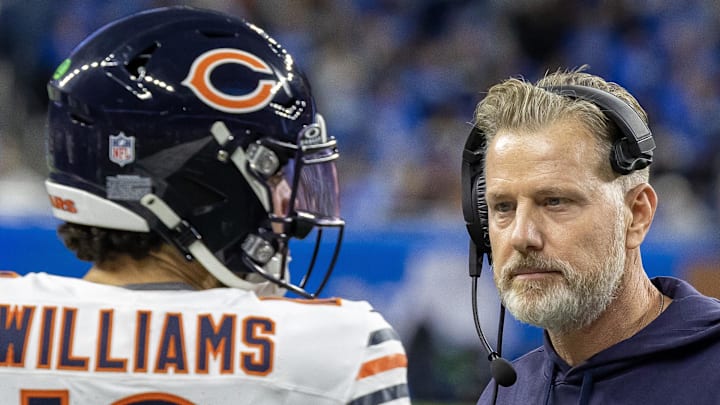The Chicago Bears (4-8) have done it again, losing a painfully close game to the division rival Detroit Lions (11-1) on Thanksgiving day to the score of 23 - 20. While the Bears kept Thursday's contest closer than many had predicted, the usual late-game woes that have affected this team under Matt Eberflus reared their ugly head yet again, this time in mind-boggling fashion.
Extending their losing streak to six games, the Bears looked relatively strong against the NFC's top-seed. Offensively, rookie quarterback Caleb Williams had yet another strong performance within the division while the defense returned to their stingy ways in the red zone.
In a game that at one point seemed like a fairly straightforward win, the Bears were unfortunately still able to edge out a loss. To figure out where the Bears went wrong, and where they can go from here, looking at the statistics is important, and these five tell the full story from Thanksgiving day:
39
Williams and running back D'Andre Swift each finished Thursday with 39 total rushing yards, tied for the highest on the team.
For the quarterback, who has now eclipsed 30 rushing yards in each of his last three games, production on the ground came more out of necessity due to the Lions' persistent pass rush. Recording 29 rushing yards in the second half alone, Williams was dynamic with his feet and consistently moved the chains on the ground.
The only other Bear to record a carry against Detroit, Swift had less success against his former squad, accumulating his total on 11 attempts. With Roschon Johnson leaving the game mid-way due to a concussion, the Bears were down some bodies at the running back position, but calling just 11 designed running back carries throughout a game is as close as a team can come to abandoning the run.
Granted, the Bears were playing with a two-score deficit for the majority of the second half, but the unit must still look to establish their identity on the ground consistently throughout an entire game. Looking across to the other sideline, the Lions ran the ball 33 times, more than double the Bears' attempt total, and it undoubtedly took a toll on the Bears defense down the stretch. If for no other reason than to avoid being one-dimensional, the Bears must balance their offensive attack on the ground and through the air, at least to prevent defensive linemen from teeing off on Williams in more obvious passing downs.
272
Alongside Williams' rushing yards, the quarterback accumulated 272 total yards in Thursday's second half alone.
The rookie's fourth game with over 250 passing yards, Thursday served as another reminder of Williams' absurd talent level, something that has delightfully been on display during the final frames of recent Bears games. Adding in his totals versus Detroit, Williams currently has 808 yards, seven touchdowns, and just one interception in his 12 combined 4th quarter performances.
.@CALEBcsw with a dime to @idjmoore 😮💨
— Chicago Bears (@ChicagoBears) November 28, 2024
📺: #CHIvsDET on CBS pic.twitter.com/TUZzXawnf7
Williams remains the offense's ultimate catalyst, and it is becoming abundantly clear that the Bears will almost always have a chance to win if number 18 is behind center. His scoring ability was even more important than his yardage from Sunday's second half, which directly led to the Bears clawing their way back into the game.
Connecting with Keenan Allen twice and D.J. Moore once, Williams scored three touchdowns in the game's final 30 minutes, eventually cutting the score down to just a one-possession difference. Considering that there was a recent four-week span in which Williams failed to throw a passing touchdown, seeing the quarterback finish with multiple scores for the second game in a row is just another sign of progress for the young star.
32
The moment it all went wrong, Williams was sacked with roughly 32 seconds remaining in Thursday's game, and the ensuing chaos is still inexplicable.
Flanked by both edge rushers on a second-down QB draw gone awry, Williams was taken down for the fifth time on the team's final drive, and with one timeout, mass miscommunication broke out along the Bears sideline. While Eberflus was preparing for the offense to get to the line quickly and run a play to potentially set up a more manageable field goal attempt, the coach allowed over 20 seconds to run off the clock by not using his final timeout.
A wild end to this one. #CHIvsDET pic.twitter.com/zwR7g1Efv9
— NFL (@NFL) November 28, 2024
Certainly, the logic of wanting a timeout to set up a field goal makes sense when considering how many people have to come on or off the field to go from offense to special teams. Still, other professional clubs have been able to make such a rapid transition without the use of a timeout, but by rather implementing strong communication and attention to detail.
Thursday's loss exhibited the complete opposite; a lack of communication and little to no attention to detail. Allowing the entirety of the clock to drain before letting your rookie quarterback audible to a half-hearted Hail Mary attempt is an indefensible lapse in coaching. When looking at all the mistakes the team has made at the end of their recent games, it is hard to not look at the leadership beyond the roster as a potential source of these hysterics in crucial situations.
